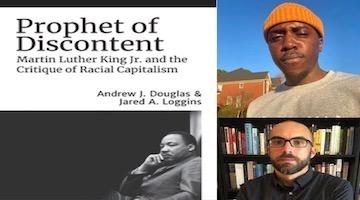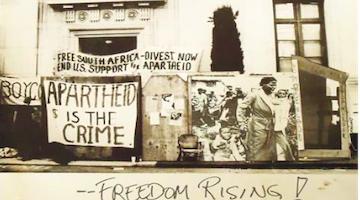For centuries, Indigenous and African peoples in the Americas have theorized for their lives and so collectively crafted a revolutionary praxis.
“If the axis of the universe remains the same in reform, what would it mean to revolutionize theory?”
Erasure in Academic Theory
[P]eople of color have always theorized—but in forms quite different from the Western form of abstract logic . . . our theorizing (and I intentionally use the verb rather than the noun) is often in narrative forms, in the stories we create . . . [in] dynamic rather than fixed ideas . . . . How else have we managed to survive with such spiritedness the assault on our bodies, social institutions, countries, our very humanity? And women, at least the women I grew up around, continuously speculated about the nature of life through pithy language that unmasked the power relations of their world . . . . My folk, in other words, have always been a race for theory—though more in the form of the hieroglyph, a written figure which is both sensual and abstract, both beautiful and communicative. —Barbara Christian, “The Race for Theory”
Contemporary African American theorists such as Barbara Christian, who writes that theory not rooted in practice is elitist, think within a community-centered tradition in which the creativity of a people in the race for theory sustains humanity. However, teaching theory as nonelitist, and intending the liberation and development of all of humanity, specifically Africana communities, contradicts much of academic theory, which is Eurocentric.[1]
All philosophy and theory, Eurocentric or Afrocentric, is political. Academic “disciplines,” when sexualized and racialized, tend to reproduce themselves in hierarchically segregated forms. To confront segregation means recognizing that current academic or educational standards have never worked, and were never intended to for us as a people. Our paltry presence in (white) universities and colleges speaks to the fact that individuals, but not the community, may attain some success in an educational process centered on the marginalization of all but the “European” (socially constructed as white, male, propertied, and heterosexual).
“To confront segregation means recognizing that current academic or educational standards have never worked, and were never intended to for us as a people.”
Philosophy or theory courses may emphasize logic and memorizing the history of “Western” philosophy rather than the activity of creating philosophies or theorizing. When the logic of propositions is the primary object of study, how one argues becomes more important than for what one argues. The exercise of reason may take place within an illogical context—in which academic canons absurdly claim universal supremacy derived from the hierarchical splintering of humanity into greater and lesser beings, or the European Enlightenment’s deification of scientific rationalism as the truly “valid” approach to “Truth.”
Some thinkers have argued that theory and philosophy are open to the “everyday” person and intend the good of humanity. However, few identify Africana people, women of color, women in general, and black women in particular, or poor people or prisoners as both equal partners in that humanity and important theorists in its behalf. Fewer still connect the “life of the mind” to the understanding that “black people have to a disproportionate extent supplied the labor which has made possible the cultivation of philosophical inquiry.”[2] They, along with female labor in the “private realm” or the “household,” have disproportionately cultivated philosophies that provide nonabstract meanings of freedom and justice. Surviving genocidal oppression allows insights into (in)humanity and (in)justice that transcend the abstractions of academic philosophy and theory, infused in Western democracies by patriarchies and Eurocentrism; theory is not synonymous with European.[3]
“Black people have disproportionately cultivated philosophies that provide nonabstract meanings of freedom and justice.”
In a society and culture where the white European represents both the ideal and universal manifestation of civilization, racist iconography infuses worldviews and misshapens European philosophy, with destructive effects on the material lives of the majority of the world’s people.[4]
Adhering to the tastes of white supremacy, “white solipsism” masquerades as universal philosophy within the myth of racial superiority.[5] If legitimizing a world order of domination becomes an intellectual mandate, like the carnival house of mirrors, theory projects what it distorts in solipsistic reflections.
Playing by academic house rules sets standards for theory that few will meet.[6] The thoughts of “outsiders” are reduced to descriptions of a part (of humanity or subhumanity) rather than analyses of a whole (humanity). When teaching about the lives of black activist women, for example, is viewed as a descent to the particular from the “universal norm” (white, male, monied), biology becomes the destiny theory (privileged biology becomes manifest destiny). Recognition as “theorists” or “intellectuals” because of their adherence or loyalty to house rules is the equal opportunity moment for former outsiders to play inside; technique is not inherently theory. (Self)Objectification through the “expert” voices of “trained” speakers could be interference.[7] Stripped of context in community may mean forced relocation to some mental or academic ghetto.[8] Extreme locations offer the vantage point of view: if the axis of the universe remains the same in reform, what would it mean to revolutionize theory?
Talking Theory
Theoretical traditions in service to community challenge the authoritative or authoritarian narratives about theory and philosophy. Outside the academic or popular worldviews of “scientific” materialism and “objective” rationalism, exist the nonduality of the sacred and secular, spiritual and political, the individual and communal. Discredited indigenous cosmologies, and political rebellions, offer concepts of not just nonlinear time, or shared spatial commitments to community, but they gesture toward the holy grail of the “beloved community.” Toni Morrison sketches transcendent theory in her observations on writing:
“If anything I do in the way of writing . . . isn’t about the village or the community or about you, then it is not about anything. I am not interested in indulging myself in some private, closed exercise of my imagination that fulfills only the obligation of my personal dreams, which is to say, yes, the work must be political.
It must have that as its thrust. That’s a pejorative term in critical circles now: if a work of art has any political influence in it, somehow it’s tainted. My feeling is just the opposite: if it has none, it is tainted.”[9]
“Discredited indigenous cosmologies, and political rebellions gesture toward the holy grail of the ‘beloved community.’”
A tradition of labor for liberated communities evokes worldviews where ethical concerns and liberatory acts move the community closer to political thought. Activism is a great and difficult learning experience, particularly if connected to communities in crisis.[10] Concretizing ethical ideals in action supports an unfamiliar form of thinking—theorizing in the face of political violence.[11] For centuries, Indigenous and African peoples in the Americas have theorized for their lives and so collectively crafted a revolutionary praxis. Fiercely struggling for collective freedom, ancestors Harriet Tubman, Ida. B. Wells, Ella Baker, Fannie Lou Hamer, along with countless others theorized with the weight of legacies not fully comprehended and rarely engaged.
Notes
[1]. Samir Amin writes: “Eurocentrism is a specifically modern phenomenon, the roots of which go back only to the Renaissance, a phenomenon that did not flourish until the nineteenth century. In this sense, it constitutes one dimension of the culture and ideology of the modern capitalist world.” Samir Amin, Eurocentrism (New York: Monthly Review Press, 1989), vii.
[2]. Elizabeth Spelman cites this quote from a journal on African Americans and philosophy in Inessential Woman: Problems of Exclusion in Feminist Thought (Boston: Beacon Press, 1988), n. 26.
[3]. Samir Amin argues that Eurocentrism “assumes the existence of irreducibly distinct cultural invariants that shape the historical paths of different peoples.” According to Amin, it is “anti-universalist” because instead of searching for “general laws of human evolution” it represents itself as universalist by claiming that “imitation of the Western model by all peoples is the only solution to the challenges of our time.” See Samir Amin, Eurocentrism, vii.
[4]. The academic mind-set mirrors white supremacy: “the idea of white supremacy emerges partly because of the powers within the structure of modern discourse—powers to produce and prohibit, develop and delimit, forms of rationality, scientificity, and objectivity which set perimeters and draw boundaries for the intelligibility, availability, and legitimacy of certain ideas.” See Cornel West, “A Genealogy of Modern Racism,” Prophesy Deliverance (Philadelphia: Westminster Press, 1982).
[5]. See Elizabeth Spelman, Inessential Woman for a discussion of “white solipsism.”
[6]. For theologian Bernard Lonergan, epistemology is based on a four-part process of: experience, reflection, judgment, and action; ethical action expands experience, self-reflection, and judging to promote consciousness of one’s own political practice. See Bernard Lonergan, INSIGHT: An Understanding of Human Knowing (New York: Harper and Row, 1957).
[7]. Patricia Hill Collins describes academic research methods rejecting emotions and communal ethics. See Patricia Hill Collins, “Learning from the Outsider Within: The Sociological Significance of Black Feminist Thought,” Social Problems 33, no. 6 (1986).
[8]. See Henry and Margaret Drewal, eds., Gelede: Art and Female Power Among the Yoruba (Bloomington: Indiana University Press, 1990), 74.
[9]. Toni Morrison, “Rootedness: The Ancestor as Foundation,” in Black Women Writers: A Critical Evaluation, ed. Mari Evans (New York: Anchor Press/Doubleday, 1984).
[10]. Bernice Johnson Reagon argues this point about plagiarism in Martin Luther King Jr.’s dissertation. See Bernice Johnson Reagon, “‘Nobody Knows the Trouble I See’; or ‘By and By I’m Gonna Lay Down My Heavy Load,’” The Journal of American History 78, no. 1 (June 1991).
[11]. In the 1990s, the Ku Klux Klan (KKK) traveled from its headquarters in Indiana to rally in the local campus town where I spent a semester as a visiting scholar. After viewing William Greaves’s documentary, A Passion for Justice, on the life of antilynching crusader Ida B. Wells, students formed a coalition, led by black women, to organize a countereducational event critiquing racism, (hetero)sexism, and anti-Semitism. At one meeting, a senior recalled being dragged off a catwalk into the bushes as her white male assailant repeatedly punched her, yelling “nigger bitch.” As she struggled to get away, she noticed white student spectators who offered no aid and later equally nonresponsive university investigators and administrators. White and black university employees and students would dismiss the anti-Klan organizers as “radical” and as “overreacting.”
The above was excerpted from Joy James’ book, Seeking the Beloved Community, (New York: State University of New York Press, 2014) pp.3-6.
This excerpt previously appeared in Brotherwise Dispatch.



















